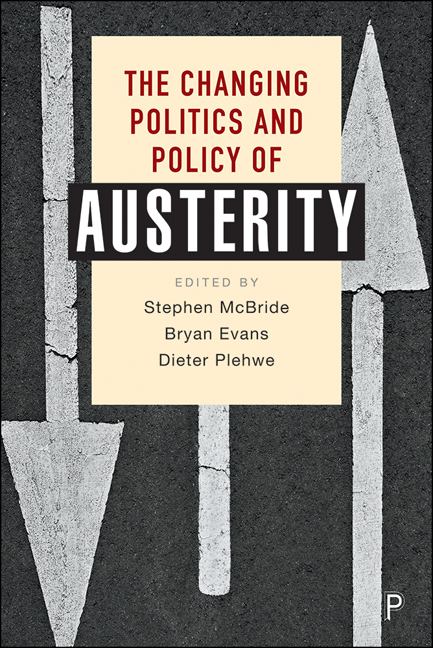Book contents
- Frontmatter
- Contents
- List of figures and tables
- Notes on contributors
- Acknowledgements
- Introduction
- PART I Austerity and the promotion of the private
- PART II Coping and casualties: labour and the social
- PART III Beyond coping: protest, pathologies and the development of real alternatives
- Conclusion
- Index
4 - Privatizing the sacrifice: individualized funding, austerity and precarity in the voluntary sector in Australia and Scotland
Published online by Cambridge University Press: 13 May 2022
- Frontmatter
- Contents
- List of figures and tables
- Notes on contributors
- Acknowledgements
- Introduction
- PART I Austerity and the promotion of the private
- PART II Coping and casualties: labour and the social
- PART III Beyond coping: protest, pathologies and the development of real alternatives
- Conclusion
- Index
Summary
Stanford (2020) argues that post-pandemic recovery requires a modern Marshall Plan, similar to the far-reaching, government-funded programme that rebuilt Western Europe after WWII. Rather than viewing the COVID-19 crisis and its accruing public debt as debilitating and responding with predictable and ineffective austerity policies, this pandemic should be viewed as an example of what governments can do when they put the well-being of their citizens ahead of the best interests of the private market. Stanford (2020) argues further that in order to rebuild the economy, governments should increase the debt in order to finance all-round reconstruction, massive fiscal injections and a Marshall Plan-like ‘willingness to use tools of direct economic management and regulation – including public service, public ownership and planning’. This includes building a fair and sustainable economy that protects groups that have been made vulnerable by government policies claiming to expand human rights and social inclusion.
Two such policies in Scotland and Australia, namely the NDIS and the Personalisation Self-Direct Care (PSDC), claimed to promote human rights and ‘consumer choice’ for people with disabilities and others requiring social care. Seen as some of the most important social policy since the National Health Service in the UK and Medicare in Australia, these policies actively restructured social care labour markets, promoted the expansion of precarious employment and precarious service organizations, and placed support and care options for service users in serious jeopardy (Howard et al 2015; Baines and Young 2020). In effect these policies pitted the rights of workers against the rights of people with disabilities in a downward sloping, zero-sum game (Baines et al 2020).
The COVID-19 pandemic seems to have exacerbated the fault lines in these pro-market social programmes with informal evidence from the first few months of the pandemic showing that vulnerable service users experienced a serious reduction in supports and services, and little or no choice in service options or workers, and many workers experienced a sharp drop in working hours and wages. Of serious concern was the increased social isolation of vulnerable service users, which expanded exponentially. In Australia, informal evidence suggests that many service users who usually received daily support found themselves with only one worker able to come in once or twice per week.
- Type
- Chapter
- Information
- The Changing Politics and Policy of Austerity , pp. 82 - 102Publisher: Bristol University PressPrint publication year: 2021



